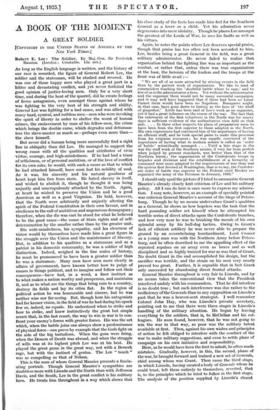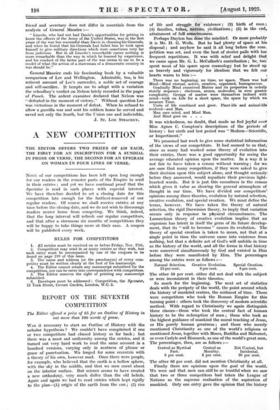A BOOK OF THE MOMENT
A GREAT SOLDIER
[COPY/LIMIT 11■1 ME UNTTED STATES OF AMERICA BY TIIE .New York Times.] Robert E. Lee : The Soldier. By Maj.-Gen. Sir Frederick Maurice. (London : Constable. 15s. net.)
As long as the English language is written, and the history of our race is recorded, the figure of General Robert Lee, the soldier and the statesman, will be studied and revered. He was one of those happy men who played a great part in a bitter and devastating conflict, and yet never forfeited the good opinion of justice-loving men. Only for a very short time, and during the heat of the quarrel, did he create feelings of fierce antagonism, even amongst those against whom he was fighting to the very best of his strength and ability. General Lee was fighting for a bad cause, and was allied with many hard, cynical, and ruthless men—men who were invoking the spirit of liberty in order to shelter the worst of human crimes, the enslavement by man of his fellow-men, the crime which brings the double curse, which degrades and dehuman- izes the slave-master as much as—perhaps even more than— the slave himself.
But never did a human being more successfully find a right line in obliquity than did Lee. He managed to support the wrong cause with all the qualities and attributes of civic virtue, courage, and high-mindedness. If he had had a trace of selfishness, or of personal ambition, or of the love of conflict for its own sake, he would, with such a cause as that to which he had attached himself, have soon lost his nobility of soul. As it was, his sincerity and his natural goodness of heart kept him free from stain. He hated slavery in itself, and wished to abolish it, though he thought it was being unjustly and unscrupulously attacked by the North. Again, at heart he wished to preserve the Union and be a good American as well as a good Virginian. He held, however, that the North were arbitrarily and unjustly altering the spirit of the Federal Constitution in their own favour, and in obedience to the call of ambitious and ungenerous demagogues ; therefore, when the die was cast he stood for what he believed to be the good cause—the cause of State rights and of self- determination by the smaller rather than by the greater unit.
His wide-mindedness, his sympathy, and his clearness of Vision would by themselves have made him a great figure in the struggle over the Union and the maintenance of Slavery. But, in addition to his qualities as a statesman and as a patriot in his domestic community, he was a soldier of high distinction. Indeed, weighed in the fine scales of history, he must be pronounced to have been a greater soldier than he was a statesman. Many men have seen more clearly in affairs of government, have known better how to judge of causes in things political, and to imagine and follow out their consequences—have had, in a word, a finer instinct as to what makes a nation worthy and prosperous, and maintains it, and as to what are the things that bring ruin to a country, destroy its fields and lay its cities flat. In the region of political action he was honourable and sincere, but he was neither wise nor far-seeing. But, though here his antagonists had far keener vision, in the field of war he had during his epoch
few or, indeed, no equals. He understood when to strike and how to strike, and knew instinctively the great but simple
secret that, in the last resort, the way to win in war is to con-
front your enemy's forces with greater forces. His was the art which, when the battle joins can always show a predominance of physical force can prove by example that the Gods fight on the side of the big battalions. When the guns were firing, when the Demon of Death was abroad, and when the struggle of wills was at its highest pitch Lee was at his best. He played the great game in the great way, not with a Berserk rage, but with the instinct of genius. The Lee " touch " was as compelling as that of Nelson.
This is the man of whom General Maurice presents a fascin- ating portrait. Though General Maurice's sympathies are
doubtless more with Lincoln and the North than with Jefferson Davis, and the South, Lee in the great conflict is his military hero. He treats him throughout in a way which shows that
his close study of the facts has made him feel for the Southern General as a lover or a child. Yet his admiration never degenerates into mere idolatry. Though he places Lee amongst the greatest of the Lords of War, he secs his faults as well as his virtues.
Again, he notes the points where Lee deserves special praise, though that praise has too often not been accorded to him. Lee, besides being a great General in the field, was a great military administrator. He never failed to realize that organization behind the fighting line was as important as the combat, or rather that, unless there was true organization at the base, the heroism of the leaders and the troops at the front was of little avail :—
" We are all of us more attracted by stirring events in the field than by the patient work of organization. We like to read of commanders teaching the doubtful battle where to rage,' and to few of us is the administrator a hero. Yet without the administrator and the organizer there would not be many successful campaigns, and it may well have happened that if there had been no Lazar Carnot there would have been no Napoleon. Bonaparte might, in that case, have gone down to history as the hero of 'the whiff of grapeshot.' Little has been said of Lee's work as an organizer, yet it had a great influence on the course of the war. The fact that the enlistment of the first volunteers in the North was for ninety days is sufficient evidence of the authoritative view held on that side. . . . In three other respects his plans of preparation seem to have been from the first superior to those adopted in the North. His own experiences had convinced him of the importance of having an efficient staff, and he took special pains to make this provision from his exiguous resources ; he was equally convinced of the importance of having what in modern armies is called an order of battle' scientifically arranged. . . . Until a late stage in the war the staff work of the Southern armies, if very far from perfect when judged by present standards, was better than that of the Northern forces ; the organization of the Confederate troops in brigades and divisions and the establishment of a hierarchy of command were more adapted to the requirements of war than was the system first devised at Washington, that is to say, the Confeder- ate order of battle was superior to the Federal until Hooker re. organized the army of the Potomac in January, 1863."
I should only spoil the picture if I tried to summarize General Maurice's already closely knit criticism of Lee and his military policy. All I can do here is once more to express my admira- tion. I may note, however, as an example of specially pointed war criticism General Maurice's account of the Siege of Peters- burg. Though he by no means undervalues Grant's qualities as a General, he shows us how hopeless was the task that the hard pounding soldier set himself when he attempted his
terrible series of direct attacks upon the Confederate trenches, and how very near he was to breaking the morale of his own splendid army by his bull-dog tactics. Owing to Grant's
lack of efficient artillery he was never able to prepare the ground by an overwhelming bombardment. Lord Cromer as a young man was with the Northern Army before Peters- burg, and he often described to me the appalling effect of the repeated repulses on an army even so brave and so well
disciplined and so highly trained for war as was that of Grant. No doubt Grant in the end accomplished his design, but the sacrifice was terrible, and the strain on his men very nearly proved too great. Further, it is arguable that in fact Grant only succeeded by abandoning direct frontal attacks.
General Maurice throughout is very fair to Lincoln, and by no means takes the conventional view that the President interfered unduly with his commanders. That he did interfere is no doubt true ; but such interference was due rather to the inefficiency of the Generals than to any supposition on Lincoln's part that he was a heaven-sent strategist. I well remember Colonel John Hay, who was Lincoln's private secretary, pointing out to me that there were three stages in Lincoln's handling of the military situation. He began by leaving everything to the soldiers, that is, to McClellan and his col- leagues. He soon found, however, that he was not going to win the war in that way, so poor was the military talent available at first. Then, against his own wishes and principles of action he felt obliged to interfere with the conduct of the war to make military suggestions, and even to settle plans of campaign on his own initiative and responsibility.
Here, as he would have been the first to admit, he often made mistakes. Gradually, however, in this, the second, phase of the war, he brought forward and trained a new set of Generals, chief among whom was Grant Then came the third stage, in which Lincoln, having created a body of Generals whom he could trust, left them entirely to themselves, reverted, that is to the principles which he tried to follow in the first stage. The analysis of the position supplied by Lincoln's closest
friend and secretary does not differ in essentials from the analysis of General Maurice :—
"Lincoln, who had not had Davis's opportunities for getting to know the officers of the Army of the -United States, was in the first years of the war less successful than Davis in choosing his Generals, and when he found that his Generals had failed him he took upon himself to give military directions which were sometimes very far from judicious. But in all Lincoln's remarkable career nothing is more remarkable than the way in which he learned by experience, and his conduct of the latter part of the war seems to me to be a model of what the action of a statesman of a democratic country in war should be."
Creneral Maurice ends his fascinating book by a valuable comparison of Lee and Wellington. Admirable, too, is his reticent account of Lee's surrender, a noble act of courage
and self-sacrifice. It tempts me to adopt with a variation the schoolboy's verdict on Nelson lately recorded in the pages
of Punch. The ardent examinee declared that Nelson was
"defeated in the moment of victory." Without question Lee was victorious in the moment of defeat. When he refused to allow a guerilla war and sent his soldiers home he served and saved not only the South, but the Union one and indivisible.
J. Sr. LOE STRACHEY.







































 Previous page
Previous page